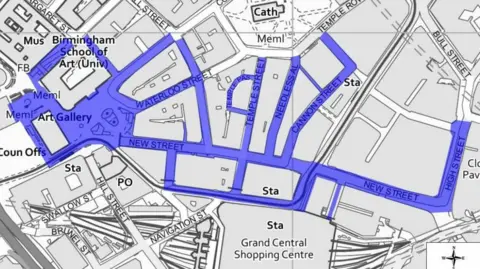Buskers call for compromise in clampdown plan
 Getty Images
Getty ImagesSome buskers and music groups have criticised plans to crack down on "excessive noise levels" in Birmingham city centre.
Plans first announced in April for a Public Space Protection Order would restrict noise from busking, street entertaining, street preaching and public speaking in areas including New Street and High Street.
One unnamed busker told a city council consultation it would make Birmingham the country's "least friendly city" for street performance and called for compromise.
The plans, which have been recommended for approval at a cabinet meeting on 22 July, follow a rise in noise complaints.
The order would also cover Victoria Square, Temple Street, Cannon Street, Needless Alley and part of Waterloo Street.
It would ban musical instruments and amplification equipment, along with any associated noise such as from entertaining or preaching.
However, the recommendation said council officers should also consider the feasibility of a permit scheme for city-centre busking.
The proposals came amid concerns noise levels were impacting businesses, residents trying to relax at home and landlords trying to let properties.
But among people responding to the consultation, one busker suggested a number of "significant compromises" could be reached, such as a restriction on amplification.
"Without some sort of compromise with the busking community, Birmingham will become the least friendly city in the country (and arguably in Europe) for street performance," the musician said.
 Birmingham City Council
Birmingham City CouncilAnother busker suggested: "Rather than restricting all performers - many of whom are professional and committed to enhancing the city's street culture - I propose that Birmingham Council consider adopting a model similar to that of Busk in London with respect to basic licensing."
Such a scheme would involve an audition process and code of conduct, they explained.
Stephen Brown, the Musicians' Union Midlands regional organiser, previously claimed the council was "using a sledgehammer to crack a nut".
He called for a more "nuanced approach" such as permitting day time busking through a "better management scheme of noise control and agreed pitches".
A council report revealed the consultation provoked a "varied response" to the proposed PSPO, but when the authority carried out further analysis to find responders who live or work in the area, 53%, or 92 people, agreed the order was the right way forward.
The report added it had to also consider feedback from businesses and organisations.
Two PSPOs are already in force in residential parts of the city centre, which are due to expire in August, but the council acknowledged there had been an increasing number of complaints in surrounding areas.
This news was gathered by the Local Democracy Reporting Service which covers councils and other public service organisations.
Follow BBC Birmingham on BBC Sounds, Facebook, X and Instagram.
